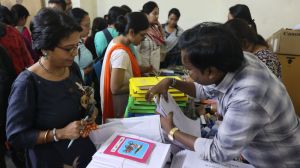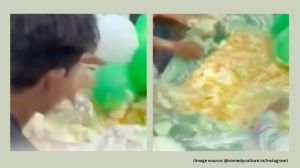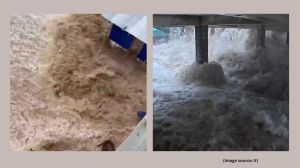Vajpayee takes step forward in J&K direction
With less than a week to go before the formal notification of elections in Jammu and Kashmir, Prime Minister Atal Bihari Vajpayee today took...

With less than a week to go before the formal notification of elections in Jammu and Kashmir, Prime Minister Atal Bihari Vajpayee today took his two-year-long Kashmir initiative a step forward by offering a dialogue with elected representatives and organisations of the state.
Using his Independence Day address to unveil his Government’s policy on Kashmir and send signals to separatist groups in the Valley, he offered to ‘‘make amends’’ for any ‘‘mistakes’’ that may have been committed in the past and assured talks on greater devolution of powers.
Pointing out that peace and democracy were at a ‘‘decisive turn’’ in J & K, he appealed to them to participate ‘‘actively and in large numbers’’ in the elections to demolish the ‘‘motivated propaganda’’ from across the border and reiterated last year’s promise of ‘‘free and fair’’ elections. This was clearly aimed at Pakistani President Pervez Musharraf who yesterday described the forthcoming elections as a ‘‘farce’’.
|
Pictures from Story continues below this ad
|
In fact, Vajpayee began his 25-minute speech — the shortest yet by a Prime Minister — with stinging criticism of Musharraf’s bluster. ‘‘Those who call the forthcoming elections in the state farcical should not give us lecture on democracy. Let them look at their own track record,’’ he declared.
Besides the separatists, there were assurances for Kashmiri pandits too. ‘‘I am confident that all the displaced people, including Kashmiri Pandits, will be able to go back to their homes with respect, in the new situation that will be created after the elections,’’ he said.
Devoting a substantial chunk of his speech to Kashmir, the Prime Minister asserted that Kashmir is a ‘‘test case of secularism’’.
He said, ‘‘India has always stood the test of a secular nation. Jammu and Kashmir is a living example of this. And this itself is kashmiriyat.’’ There were echoes of similar sentiments when he touched on the recent communal violence in Gujarat and went beyond describing it merely as ‘‘unfortunate’’. It was an example of how casteism and communalism divided people, he said, adding, ‘‘There can be no place for such violence in a civilised society. It is the responsibility of the government and society alike to provide security and equal opportunities for minorities.’’
Later in the day, the Prime Minister unveiled a 15-point initiative which announced the induction of Agni and supersonic Brahmos missiles in India’s defence armoury.
While listing the achievements of his Government and the progress the nation had made in 55 years of Independence, Vajpayee lamented that there was not enough consensus on social and economic issues. Consensus was necessary, he stressed, for the country to fight its biggest enemy — poverty.
In this context, he identifed one crucial area in which consensus proved elusive but was vital — the power sector. Scarcity of electricity has assumed the proportions of a crisis in many states, he said, and to overcome it, it was necessary not just to change the mindset of political parties but also of the people.
He appealed to political parties across the board to arrive at a minimum agenda for power reforms to provide quality and uninterrupted service, pointing out that even farmers are willing to pay more for it.
Vajpayee also announced a slew of short and long-term measures to tackle the acute drought in different parts of the country. A new initiative — pradhan mantri gramin jalsamvardhan yojana — for the conservation of water would be launched soon, he revealed.
One lakh handpumps would be installed in areas affected by water scarcity and the same number of primary schools in rural areas would be provided with drinking water facilities, he said, adding that one lakh traditional sources of drinking water would be revived soon.
In the course of his speech, he touched on a number of issues, including the need for political consensus on economic reforms, especially in the key power sector and electoral arena. He also announced that the Home Ministry is preparing a plan to issue multi-purpose machine-readable identity cards to all citizens for which a pilot project will be launched in October this year to cover select districts in eight states.



- 01
- 02
- 03
- 04
- 05




























